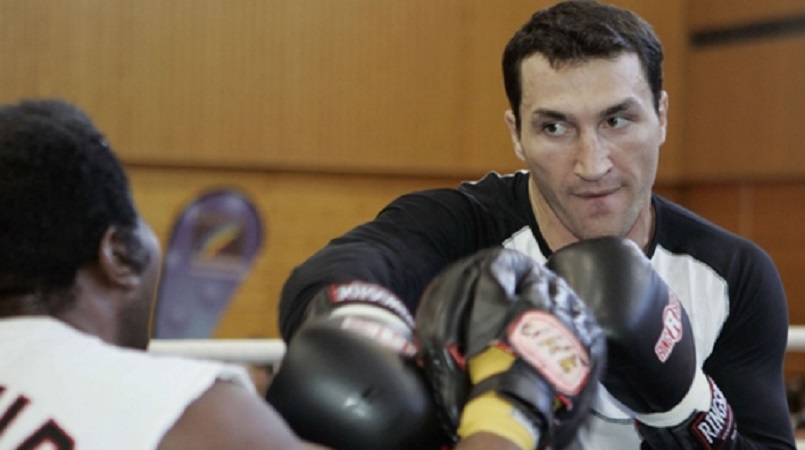
In the middle of a filmed retirement statement that was somehow both profound and entertainingly hammy, there it unmistakably was; Wladimir Klitschko dropped in a Mayweatherism.
After listing a diverse range of achievements and business interests, the 41-year-old former two-time world heavyweight champion concluded: "I was capable of doing all this because of the global appeal of the sport of boxing."
Adding "the sport of" before mentioning the name of his chosen profession is a long-established conversational tick of Floyd Mayweather Jr's – an attempt to saddle his perpetual campaign of self-aggrandisement with a sense of higher purpose benefiting the noble art as a whole.
The element of circus around Mayweather always ran alongside dazzling wins brought about by immaculate skills until the announcement of his farcical encounter with MMA star and boxing novice Conor McGregor. The ringmaster and cynical profiteer is running the show in the knowledge the supreme sportsman barely needs to turn up in order to secure a 50th career victory.
That sideshow's appeal is obvious, but do not be fooled by the notion that Mayweather v McGregor now defines the engrossing, beguiling, warped and too-often disturbing boxing landscape.
For it was this place of jarring and remarkable contrasts where erudite, multi-lingual gentleman Wladimir Klitschko perfected his craft as an amateur and professional for 27 years. Despite losing his final bout to Anthony Joshua and opting against a Las Vegas rematch with the man keen to emulate his near decade-long dominance of boxing's blue ribbon division, Klitschko departs with dignity intact and ample respect – long overdue in some quarters – safely banked.
Wow! So many people interested in my statement. Server broke down. So look here…https://t.co/iZnjFtxHeT
— Klitschko (@Klitschko) August 3, 2017
The process of Klitschko's reputation maturing like a fine wine has been underway for a few years. His 23 world heavyweight title defences is bettered only by Joe Louis' 25. He had 18 in succession during a second reign spanning nine years and seven months before being baffled to a limp loss by the maverick Tyson Fury in November 2015. Only Louis and Larry Holmes (20) boast more.
Yet, Klitschko's place in history is not given a free pass by those numbers. In May this year, after exhaustive polling of trainers, matchmakers, media and historians, Ring Magazine ranked Wladimir as the 16th best heavyweight of all time – one place above older brother Vitali.
The silblings' packaging as a pair did Wladimir few favours in as they moved towards the upper echelons of the highest weight class in the late 1990s. Boxing's traditional American fanbase began to switch off as the country's virtually unbroken dominance subsided. Naturally, the Klitschkos were to blame for this and not a dwindling and undisciplined pool of Stadeside talent.
Vitali's only defeats arrived via a shoulder injury against Chris Byrd in 2000 – one Wladimir would avenge to grab a first world title six months later – and on cuts after giving Lennox Lewis an almighty scare in his final outing.
The elder Klitschko conformed to the heavyweight ideal of being a bone-shuddering toughman. Wladimir, on the other hand, displayed clear vulnerability and a career built around keeping a questionable chin out of harm's way never truly chimed with the more bloodthirsty element of boxing's clientele.
Watch back as Wladimir @Klitschko was cheered out of the ring back in April pic.twitter.com/Vv1OcpYeFa
— Matchroom Boxing (@MatchroomBoxing) August 3, 2017
A rocketing career on the back of 1996 Olympic gold tumbled to earth with a stoppage loss against journeyman Ross Puritty and Corrie Sanders extinguished his initial tenure as champion in a brutal five and a half minutes in Hannover back in 2003.
Another humiliation at the hands of Lamon Brewster followed a year later, but, by this stage, Klitschko had the great Emmanuel Steward in his corner. It would prove a career-defining alliance.
A masterful trainer with an encyclopaedic knowledge and instinctive feel for his sport, Steward set about remodelling Klitschko's style. Underpinned by regularly under-appreciated footwork, his fighter would get back to basics and see off all comers behind a relentless ramrod jab and punishing straight right.
Those two punches alone won many a fight at a canter, sometimes to Steward's chagrin, as when a trumpeted unification against Sultan Ibragimov at Madison Square Garden in 2008 ended with both a landslide decision victory and boos.
But consider a fighter exposed as vulnerable repeatedly and relentlessly besting men who, by definition of their weight class, were capable of knocking him senseless each time he stepped through the ropes. Klitschko's feats of skill, longevity and bravery are of immense credit to him and a fillip to those railing against recent demonstrations that boxing simply boils down to boneheaded machismo.
His retirement provides a timely reminder of historic accomplishments that will endure long after the circus leaves town in Vegas later this month.
